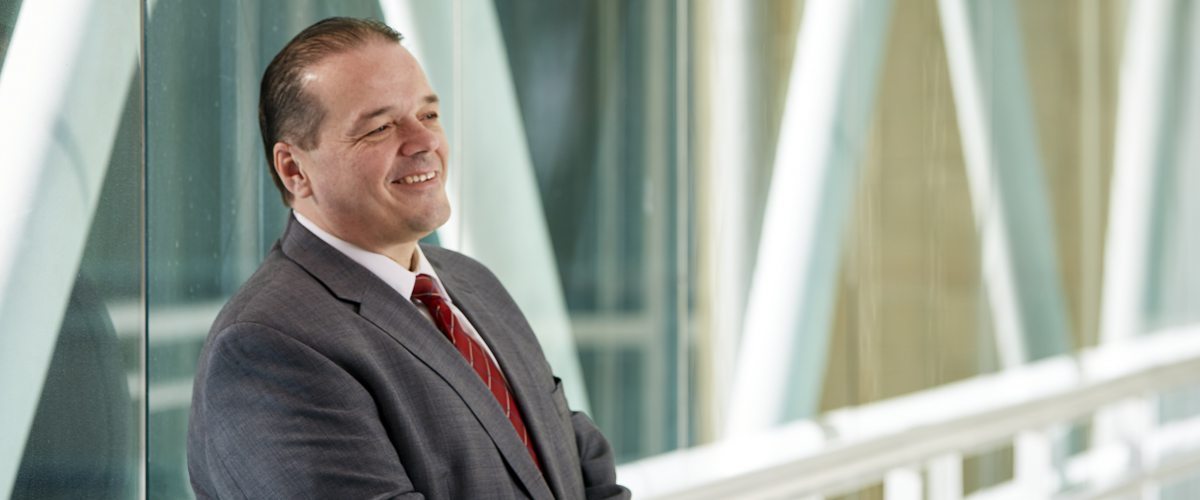Inside NYP: Andres “Andy” Nieto
The security officer turned director of Community Health & Outreach tells us how he got his start.

My family immigrated to the U.S. from Uruguay when I was 6, and my dad started working here at NewYork-Presbyterian as a mortician in the pediatric pathology department — worked here for 20 years. I grew up coming to the NewYork-Presbyterian Columbia University Irving Medical Center campus to visit my dad at work after school, to spend time with him.
We lived on 176th and Pinehurst, and I went to school down the block on Fort Washington Avenue. So I was exposed to the hospital environment both as a visitor and patient very early in my life.
After I graduated from high school, I went on a two-year mission to the Dominican Republic and got to see poverty on a different level. Having grown up in New York in a lower-middle-class environment, but then going to the Dominican Republic, I saw the lack of public health and got an eye-opening view of what people have to endure.
Public health and disparities in healthcare have always been very important to me. When I came back from doing this missionary work, I started thinking about what I was going to do with my life. My father got me a job here at the hospital working as a security officer. I thought I was going to work here for maybe a year, save some money, and go to college. I was fortunate enough to have supervisors and managers who saw something in me and made it easy for me to go back to school while also giving me opportunities to grow here.
Thanks to NewYork-Presbyterian, which helped partially pay for my college education through the employee educational assistance program, I was able to go to school while working full time, first as a security officer, then as a supervisor in the security department, then in patient relations and later as director of volunteer services.
Public health and disparities in healthcare have always been very important to me.
Andres “Andy” Nieto
Over the years, one of the biggest challenges I saw was how difficult it was for people who came to the hospital who didn’t speak English. Many times when I’d come to the hospital as a kid — just 10 or 12 years old — doctors would ask me to interpret for patients because I spoke Spanish and English. So one of the things that I take the most pride in having created is the Volunteer Interpreter Program. That was one of the first programs where we identified an issue and got a grant to pay for the resources, and we were able to develop a program that benefited the community. When I say “we” I mean in partnership with physicians who understand and appreciate the importance of addressing specific needs.
That’s what got me so interested in community health and community programs. I saw that there were others who understood the need and that there were resources available, in the form of grants, and that there were things we could do to help.
Then in collaboration with our pediatricians we just started to come up with ideas and became much better at writing grants. So we started all these programs that are still in the community today: Healthy Schools Healthy Families; Choosing Healthy & Active Lifestyles for Kids (CHALK), a program that works to reduce childhood obesity in northern Manhattan and was recognized by Michelle Obama’s Let’s Move! Active Schools initiative; the Lang Youth Medical Program, which serves youths in the Washington Heights and Inwood communities who aspire to careers in healthcare; and Turn 2 Us.
I never saw or heard from my school guidance counselor growing up probably due to the lack of resources in NYC public schools. Programs like Lang, CHALK and Turn 2 Us can really make a difference for kids by preventing at-risk behaviors — through sports, activities, academics, drama or writing — and focusing their energy in a healthier way.
Then the opportunity came to become director of community health under the Ambulatory Care Network, my current job. We started targeting populations that needed healthcare but who were using the emergency room as their primary care instead of coming to the hospital. We created targeted outreach programs for cabdrivers, bodega owners, and the faith-based community, as well as community health workers programs and an emergency department-based Patient Navigator Program, which helps patients navigate the healthcare system.
We try to reach as much of the community as we can, and try to develop programs that will have a positive effect on these people. I care about this community deeply and I love this institution — it’s where I grew up. The best part about this job is knowing you’re helping people every day.
Andres “Andy” Nieto is the director of Community Health & Outreach for the Ambulatory Care Network at NewYork-Presbyterian, where he manages community health programs funded by NewYork-Presbyterian, government grants and philanthropic organizations. Nieto works with community leaders to develop and implement nationally recognized initiatives designed to reach individuals who are medically underserved and lack access to high-quality healthcare.
